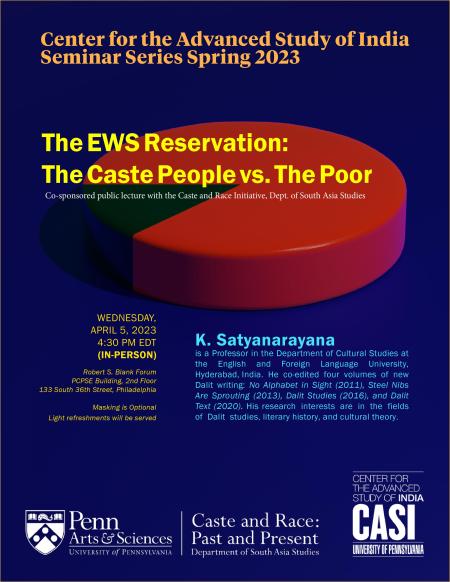The EWS Reservation: The Caste People vs. The Poor
*This event does not offer a virtual option*
Robert S. Blank Forum
PCPSE Building (2nd Floor)
133 South 36th Street
Philadelphia PA 19104
*Masking is optional*
About the Lecture:
The Supreme Court of India recently delivered its judgment in Janhit Abhiyan v Union of India and held that the 103rd Amendment Act, 2019 is constitutional. The Act provides 10 percent reservations in public employment and education for economically weaker sections (EWS) based on economic criteria. It uses the equality provisions of the Indian Constitution (Articles 15 and 16) to introduce reservations for the EWS as a separate quota other than the reservations for SC, ST, and OBC categories. The inclusion of the category of EWS under the system of reservations is an attempt to undermine the caste basis of the reservations. The majority judgment constructs the EWS category as a class category with no identifiable caste identity. It reinforces the stereotypical view that India has empirically identifiable "caste people" (SC, ST, OBCs) and the abstract "poor" people. Drawing on the minority judgment that foregrounds the caste basis of reservations in India and the role of caste in making the poor, Professor Satyanarayana attempts a critique of the category of EWS and argues that caste is an important category to understand inequality in India.
About the Speaker: K. Satyanarayana is a Professor in the Department of Cultural Studies at the English and Foreign Language University, Hyderabad, India. Currently, he is a Visiting Scholar in the Department of South Asia Studies, University of Pennsylvania. He is the author or editor of numerous essays and books in the fields of Dalit studies, literary history, and cultural theory. These include two co-edited volumes of new Dalit writing: No Alphabet in Sight (Penguin, 2011) and Steel Nibs Are Sprouting (Harper, 2013); two co-edited collections of critical essays: Dalit Studies (Duke University Press, 2016) and Dalit Text (Routledge, 2020), and most recently Concealing Caste (forthcoming 2023 from Oxford University Press).
K. Satyanarayana is a Professor in the Department of Cultural Studies at the English and Foreign Language University, Hyderabad, India. Currently, he is a Visiting Scholar in the Department of South Asia Studies, University of Pennsylvania. He is the author or editor of numerous essays and books in the fields of Dalit studies, literary history, and cultural theory. These include two co-edited volumes of new Dalit writing: No Alphabet in Sight (Penguin, 2011) and Steel Nibs Are Sprouting (Harper, 2013); two co-edited collections of critical essays: Dalit Studies (Duke University Press, 2016) and Dalit Text (Routledge, 2020), and most recently Concealing Caste (forthcoming 2023 from Oxford University Press).

